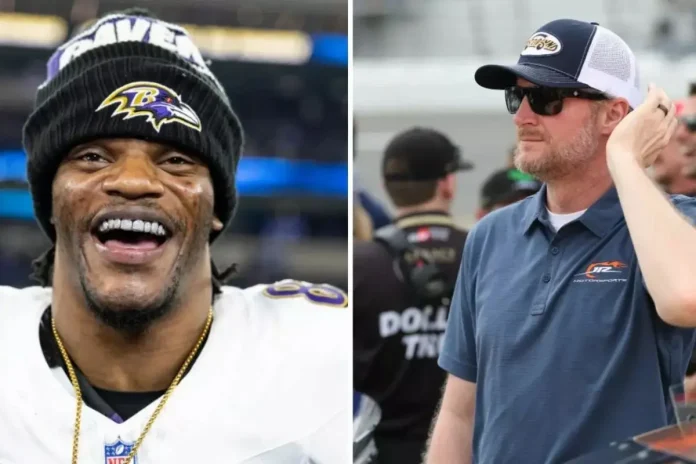In the world of sports, rivalries and disputes are commonplace, but there are times when even the most heated disagreements come to an end in unexpected ways. The recent “NASCAR-style” dispute between legendary NASCAR driver Dale Earnhardt Jr. and Baltimore Ravens quarterback Lamar Jackson is one such instance. What started as a disagreement over style, branding, and sports culture has now been amicably settled, bringing closure to a saga that had captured the attention of both the motorsport and football worlds.
This dispute, although centered on seemingly trivial matters of personal style and professional branding, speaks to the larger intersection of sports culture, media influence, and the evolving nature of athlete identities. Earnhardt Jr., one of the most recognized figures in NASCAR, and Jackson, a star in the NFL, both occupy unique places in the sports universe. Their involvement in a public back-and-forth stirred considerable discussion, and the resolution of their differences signals an important moment for both athletes and their respective fan bases.
How the Dispute Began: A Clash of Sports Cultures
The dispute between Earnhardt Jr. and Jackson stemmed from an exchange of ideas on what defines a true “NASCAR style,” a term that both athletes had different interpretations of. The issue began during a series of interviews and social media exchanges where Earnhardt Jr. was quoted making statements about Jackson’s approach to sports branding. While Earnhardt, a legend in the NASCAR world, viewed his own style as emblematic of the motorsport culture, Jackson, a player known for his dynamic play on the field and engaging personality, took issue with the notion of style being restricted to any one sport or identity.
Earnhardt Jr. had long been associated with a particular image — that of a traditional NASCAR driver who embodied the values of racing: speed, precision, grit, and a certain ruggedness. NASCAR, with its roots in southern culture and its association with an old-school style of racing, often relies on its established traditions and fan expectations. Earnhardt Jr.’s position, though well-intentioned, was seen by some as an attempt to box athletes into predefined molds based on the sport they represent. This, inevitably, created tension when he made comments that seemed to criticize athletes like Jackson for not adhering to a “traditional” sports persona.
For his part, Lamar Jackson, who has built his own brand around his authenticity, dynamism, and style both on and off the field, rejected the notion that athletes should be pigeonholed into one category. Known for his flashy style, electric plays, and larger-than-life personality, Jackson has cultivated a unique image that resonates with a diverse fan base. His stance on self-expression and individuality, both in sports and outside of it, stood in stark contrast to Earnhardt Jr.’s traditional viewpoint.
The friction between the two men became more apparent after Jackson publicly responded to Earnhardt’s comments, arguing that the concept of “style” in sports should be open to interpretation. What Jackson emphasized was that every athlete has the right to express themselves in their own way, regardless of the sport they play. As the back-and-forth grew, the media began to pick up on the story, further fueling the dispute. Fans of both athletes, as well as commentators from various sports backgrounds, weighed in, offering their takes on the issue.
The Heart of the Dispute: Athlete Branding and Authenticity
At its core, the Earnhardt Jr. vs. Jackson dispute wasn’t just about fashion or appearance; it was about the evolving role of athletes as cultural influencers. The lines between sport, entertainment, and personal branding have become increasingly blurred in the modern age, and both Earnhardt Jr. and Jackson have become prominent figures in shaping these intersections.
Dale Earnhardt Jr. has long been considered a stalwart of NASCAR, not only for his on-track accomplishments but also for his ability to connect with fans and establish a lasting presence in the media. He epitomizes the traditional image of a racer, someone who adheres to the values and codes of the sport. However, in recent years, Earnhardt has also taken on a more media-centric role as a commentator and podcast host, where he’s spoken more candidly about various issues, including the changing dynamics in sports culture.
On the other hand, Lamar Jackson represents the new wave of athletes who view their careers as more than just about their sport. Jackson has taken a progressive approach to his personal branding, using his social media platforms to engage with fans, promote his unique style, and highlight causes that matter to him. His athleticism and charisma make him an undeniable force in the NFL, but it’s his authentic approach to self-presentation that sets him apart from other quarterbacks.

